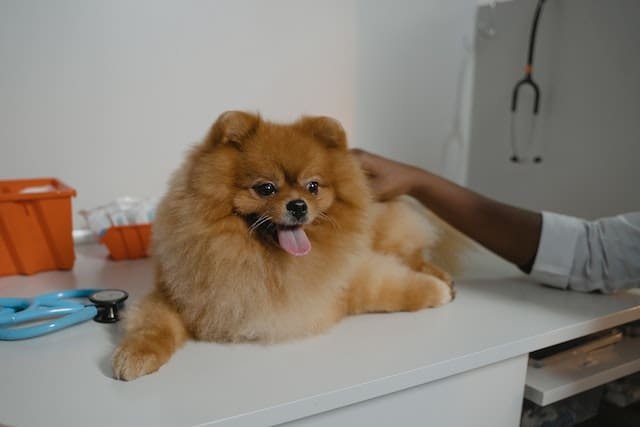Table of Contents
Step into the captivating world of the Pomeranian skull, where fluffy cuteness gives way to fascinating anatomy and bone structure. In this article, we will embark on a journey that reveals the hidden intricacies within these beloved pets.
Understanding The Anatomy Of a Pomeranian Skull
The Pomeranian breed is known for its small size and fluffy appearance, but what lies beneath that adorable exterior? The Pomeranian skull is a remarkable structure that holds the key to their unique characteristics.
The skull of a Pomeranian is composed of various bones that come together to form a protective casing for the brain. It consists of the cranium, which houses the brain, the facial bones, which support the eyes and snout, and the mandible, or lower jawbone. These bones are intricately connected, allowing for movement and flexibility.
One of the distinctive features of a Pomeranian skull is its rounded shape. This rounded skull gives Pomeranians their characteristic baby-like appearance, with their large, expressive eyes and small snouts. The shape of the skull also contributes to their playful and lively nature, as it allows for a wide range of facial expressions.
Unique Features Of The Pomeranian Skull
The Pomeranian skull possesses several unique features that set it apart from other dog breeds. One of the most notable features is the size and shape of their eyes. Pomeranians have large, almond-shaped eyes that are set wide apart. This gives them a wide field of vision and enhances their ability to observe their surroundings.
Another distinctive feature of the Pomeranian skull is its small snouts. Pomeranians have short muzzles with a compact jaw structure, contributing to their adorable appearance. Despite their small snouts, Pomeranians have a full set of teeth, including sharp incisors and canines for tearing and grinding food.
Additionally, the Pomeranian skull has a rounded shape, characteristic of the breed. This rounded shape not only adds to their cuteness but also plays a role in their overall health and well-being.
The Role Of The Skull In Pomeranian Health
The skull plays a crucial role in a Pomeranian’s overall health and well-being. A properly formed skull allows for the proper development and functioning of the brain, eyes, and other vital organs.
The size and shape of the skull can affect the Pomeranian’s ability to eat and drink properly. Pomeranians with narrow skulls may have difficulty chewing or be more prone to dental issues. It is essential to provide them with appropriate-sized food and ensure regular dental care to maintain their oral health.
Furthermore, the skull shape can also impact their respiratory function. Pomeranians with shorter snouts may be more prone to respiratory problems, such as snoring or difficulty breathing. Proper care and monitoring of their respiratory health is essential to prevent any complications.

Common Skull-Related Health Issues In Pomeranians
While Pomeranians are generally healthy dogs, they can be prone to specific skull-related health issues. One common issue is dental problems. Due to their small size and crowded dental arches, Pomeranians may be susceptible to dental plaque buildup, gum disease, and tooth loss. Regular dental care, including brushing and professional cleanings, prevents these issues.
Another health issue that can affect Pomeranians is patellar luxation, which is the dislocation of the kneecap. This condition can be related to the shape and structure of their skulls, as it affects the alignment of their bones and joints. Regular exercise and weight management can help reduce the risk of patellar luxation in Pomeranians.
Additionally, Pomeranians may be prone to eye problems, such as cataracts and dry eye syndrome. These issues can be related to the size and shape of their eyes, as well as genetic factors. Regular eye check-ups and proper eye care are essential for maintaining visual health.
Tips For Maintaining a Healthy Pomeranian Skull
To ensure the health and well-being of your Pomeranian’s skull, there are several tips to remember. Firstly, provide them with a balanced diet that meets their nutritional needs. This will promote proper growth and development, including forming a healthy skull.
Regular dental care is also crucial for maintaining a healthy Pomeranian skull. Brush their teeth regularly with dog-specific toothpaste and provide them with appropriate chew toys to help keep their teeth clean and strong. Regular dental check-ups with a veterinarian are also recommended.
In addition, it is essential to monitor your Pomeranian’s respiratory health. Avoid exposing them to extreme temperatures and provide a comfortable and well-ventilated environment. Regular exercise and weight management can also help support their respiratory function.
Surgical Procedures Involving The Pomeranian Skull
In some cases, surgical procedures may be necessary to address specific skull-related issues in Pomeranians. For example, dental extractions may be required to remove damaged or infected teeth. This can help alleviate pain and prevent further complications.
In cases of severe respiratory issues, surgical intervention may be necessary to improve the airflow and alleviate breathing difficulties. This can involve widening the nasal passages or correcting any abnormalities obstructing the airway.
It is essential to consult with a veterinarian who specializes in small dog breeds, such as Pomeranians, to determine the best course of action for any surgical procedures.

Interesting Facts and Myths About Pomeranian Skulls
Here are some interesting facts and myths about Pomeranian skulls:
- Myth: Pomeranians have fragile skulls – While Pomeranians may have smaller and more delicate skulls compared to larger dog breeds, they are not fragile. Their skulls are strong and provide adequate protection for their brains.
- Fact: Pomeranians have a higher risk of dental issues – Due to their small size and dental crowding, Pomeranians are more prone to dental problems. Regular dental care is essential to maintain their oral health.
- Myth: Pomeranians have a flat skull – Pomeranians have a rounded skull, contributing to their cute appearance. The rounded shape results from selective breeding and does not cause any functional or health issues.
- Fact: Pomeranians have a strong bite force – Despite their small size, Pomeranians have a surprisingly strong bite force. This is due to their well-developed jaw muscles and teeth.
Conclusion
The Pomeranian skull is a fascinating structure that holds the key to the unique characteristics of these beloved pets. From their expressive eyes to their small snouts and rounded skulls, every aspect of their skull contributes to their overall health and well-being.
By understanding the anatomy and unique features of the Pomeranian skull, we can better appreciate the complexity beneath their fluffy exteriors. So next time you look into the adorable face of a Pomeranian, remember the fascinating journey that takes us from fluff to bone.

